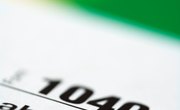Pennsylvania generally does not levy state income tax on distributions from a 401(k) plan, as long as you receive those distributions after age 59 1/2. This makes Pennsylvania different from the federal government and most other states, which tax all 401(k) distributions. However, that doesn't mean 401(k) accounts in Pennsylvania go untaxed; if you withdraw money, you will be subject to a 401k state tax.
Tips
Unless you choose to withdraw funds from your 401(k) prior to the age of 59 1/2, you will not be taxed on your distributions in Pennsylvania. Early distributions will not face a penalty, but will be subjected to Pennsylvania state income tax laws.
Retirement Income is Taxable in PA, Including 401(k) Plans
An employer-sponsored 401(k) plan allows you to save money for retirement by diverting some of your wages into an investment account. You pay no income tax on any profits made from investments in the 401(k). Then, once you reach age 59 1/2, you can start withdrawing money from the account. In the language of the plans, the money you put into the account is your "contribution;" the money you take out is a "distribution." In the federal tax system – and most state income tax systems – you don't pay income taxes on your 401(k) contributions. All taxes are deferred, for years and often decades, until you take a distribution. Even then, you pay tax only on the money you actually take out, regardless of how much you put in, how much you've profited from your investments or how much money is in the account. But that's not how Pennsylvania does it.
Pennsylvania's tax treatment of 401(k) plans is essentially the opposite from the federal system's. In Pennsylvania, your 401(k) contributions are fully taxable in the year you make them. Investment profits are still tax-free. Then, when you reach the eligible age of 59 1/2, your distributions are completely untaxed.
The PA Tax Rate for Early 401k Withdrawal Does Not Include Penalties
If you make a withdrawal from your 401(k) plan before turning 59 1/2, however, then that money might be subject to Pennsylvania income tax. Pennsylvania taxes early distributions on a "cost recovery basis." That means you don't pay taxes until your total distributions exceed your total contributions. Suppose you've contributed a total of $10,000 to your 401(k), and your account has grown to $30,000. If you were to take money out before age 59 1/2, you wouldn't pay Pennsylvania tax on the first $10,000 because that was your own money, which had already been taxed before you deposited it. But everything above $10,000 will be taxed. Under the federal system, by contrast, early distributions are not only fully taxable, they're also subject to a 10 percent penalty, though the penalty can be waived in certain "emergency" or "hardship" situations.
Reporting a Taxable Distribution for 2017 or 2018
Anyone who receives a distribution from a 401(k) should get a copy of Form 1099-R at the end of the year, whether filing for 2017 or 2018. Plan administrators use this form to report how much you received in distributions. The total amount of the distribution appears in Box 1. If it's an early distribution, subject to Pennsylvania tax, Box 7 of the form will have a distribution code of either "1" or "2." Your plan administrator should be able to tell you whether your distributions have exceeded your contributions and, if so, by how much. Include the taxable amount on Line 1a of Form PA-40, the Pennsylvania personal income-tax return.
References
- Pennsylvania Department of Revenue: Pennsylvania Personal Income Tax Return Instructions (2017)
- The Motley Fool: Are 401(k) Distributions Taxable in Pennsylvania?
- Pennsylvania Department of Revenue. "Personal Income Tax." Accessed Aug. 13, 2020.
- Pennsylvania Department of Revenue. "Deductions Allowed For Pennsylvania Tax Purposes." Accessed Aug. 13, 2020.
- Pennsylvania Department of Revenue. "PA Schedule UE—Unreimbursed Business Expenses." Accessed Aug. 13, 2020.
- PA529. "Frequently Asked Questions: What Are the Income Tax Benefits of Investing in a PA 529 Account?" Accessed Aug. 13, 2020.
- Pennsylvania Department of Revenue. "Tax Forgiveness." Accessed Aug. 13, 2020.
- Pennsylvania Department of Revenue. "Brief Overview and Filing Requirements." Accessed Aug. 13, 2020.
- Pennsylvania Department of Revenue. "Personal Income Tax Filing Options." Accessed Aug. 13, 2020.
- Pennsylvania Department of Revenue. "COVID-19 Information." Accessed Aug. 13, 2020.
Writer Bio
Cam Merritt is a writer and editor specializing in business, personal finance and home design. He has contributed to USA Today, The Des Moines Register and Better Homes and Gardens"publications. Merritt has a journalism degree from Drake University and is pursuing an MBA from the University of Iowa.

